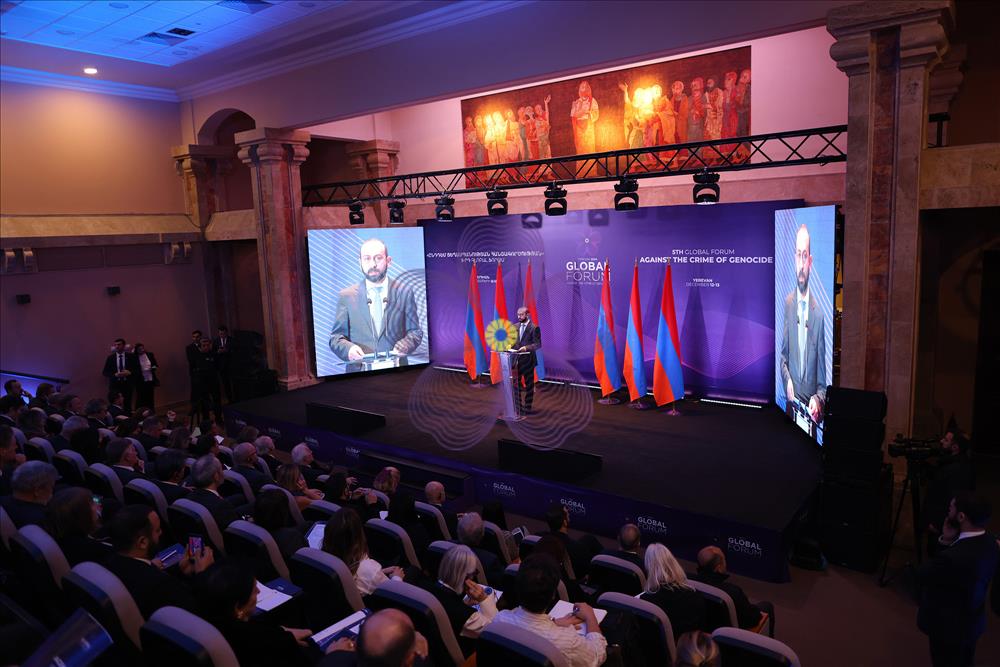
Yerevan Forum Focuses On Bolstering Genocide Prevention Mechanisms
The forum included panel discussions on genocide and mass crime prevention, gaps in international legal and political frameworks and international crimes. Participants also discussed mechanisms for early alerts of mass crimes.
President of the Republic of Armenia Vahagn Khatchaturyan and Minister of Foreign Affairs of the Republic of Armenia Ararat Mirzoyan delivered opening remarks at the forum's opening. A message from UN Secretary-General Antonio Guterres was also read at the opening ceremony.
President Khatchaturyan stated,“Since its independence and accession to the United Nations, the Republic of Armenia, as the state of the descendants of a people who endured the ordeal of the Armenian Genocide, has undertaken a leading role in international multilateral platforms in advancing issues of genocide prevention, punishment, and commemoration of victims.”
Foreign Minister Mirzoyan emphasized the importance of protecting national, racial and ethnic groups within the international human rights system. He said,“At the same time, it is clear that the only guarantee of success in this regard is the close international cooperation, including between UN structures, regional organizations, member states, non-governmental organisations and other actors.”
UN Secretary-General Antonio Guterres' message stressed the need to strengthen preventative measures, including education and countering misinformation that can fuel hate speech and genocidal intent. His message also said,“We must respect and implement decisions of the International Court of Justice on the application of the Convention.”
On December 13, Deputy Minister of Foreign Affairs Vahan Kostanyan delivered closing remarks. He thanked the speakers for their substantial contributions, highlighting the importance of leadership from like-minded small states in promoting genocide prevention. Kostanyan added,“We are the international community, and we are the ones who should apply the international law.”
The forum brought together representatives from states, international organisations, including current and former UN officials, regional arrangements, national human rights institutions, and civil society, including the representatives of international NGOs, media practitioners, academic experts, researchers and scholars.
The Yerevan Declaration of Joint Action, adopted at the Fourth Global Forum Against the Crime of Genocide in 2022, served as a guiding document for the forum. The declaration reaffirmed the significance of the Convention on the Prevention and Punishment of the Crime of Genocide, adopted by the General Assembly in 1948. It also recognised the role of the UN Special Adviser on the Prevention of Genocide and the responsibility of the UN Security Council for maintaining international peace and security.
The declaration also addressed concerns about the use of new technologies. It recognised both the potential of digital tools and artificial intelligence as early warning mechanisms and the security risks they pose in the spread of hate speech and extremist ideologies.
The declaration expressed deep concern about online hate speech, cyberbullying and the spread of disinformation and misinformation, particularly on social media. It emphasised the need for a safe digital space where human rights are respected without discrimination and encouraged tech companies to enhance content moderation.
The declaration further highlighted the need for citizens to have media literacy, and for governments to adopt social media regulations to address hate speech. It also recognised that reliable digital evidence is important to ensure accountability for genocide and other crimes. The declaration concluded with a commitment to build resilient and inclusive societies where new technologies advance peace, security, human rights and sustainable development, and contribute to preventing atrocity crimes.

Legal Disclaimer:
MENAFN provides the
information “as is” without warranty of any kind. We do not accept
any responsibility or liability for the accuracy, content, images,
videos, licenses, completeness, legality, or reliability of the information
contained in this article. If you have any complaints or copyright
issues related to this article, kindly contact the provider above.


















Comments
No comment